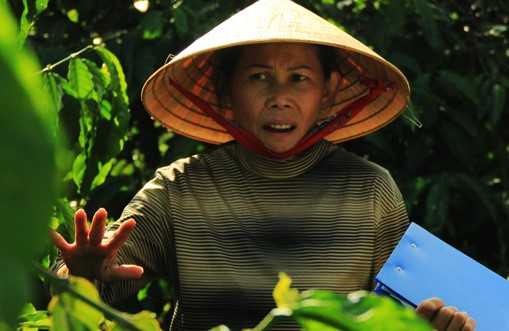Ho The struggled for years to make ends meet on her small farm in Vietnam’s Central Highlands. “We were unable to save any money,” says the 60-year-old, one of more than 500,000 Vietnamese small farmers whose livelihoods depend on a successful coffee crop.
That’s because coffee-growing is tough—particularly in Vietnam, which achieved its status as the world’s second-largest coffee producer at some cost.
As coffee became the country’s key export in the 1990s, and growers pushed for higher yields, large amounts of farmland were over-fertilized and over-irrigated. Eventually, yields dropped, crop quality declined, and growers like Ho were making less money.
IFC (International Finance Corporation, a member of the World Bank Group) saw an opportunity to change the landscape—by enabling farmers such as Ho meet the rising global demand for high-quality coffee beans.
So we teamed up in 2007 with Switzerland’s ECOM Agroindustrial, one of the world’s largest coffee-trading companies, to establish a series of training centers across the world—in Latin America, Africa, and Asia—to help farmers meet the sustainability standards demanded by global coffee buyers.
One of these centers opened in 2010 in Ho’s province of Lam Dong. The 4.3-hectare center, equipped with a laboratory and demonstration plots, helps small farmers qualify for globally recognized sustainability certifications offered by UTZ, Rainforest Alliance, and 4C.
Premium Price for Premium Coffee
At the training center, IFC and ECOM help growers—particularly women like Ho—achieve their economic potential by encouraging their participation in the center’s training sessions.
Coffee growers are introduced to codes of conduct of coffee certification programs and good agriculture practices (GAP) techniques for growing coffee.
This includes pest and diseases control, fertilizer application, composting, irrigation, harvest and post-harvest, and pruning.
The six demonstration plots illustrate different techniques of sustainable coffee production such as using organic fertilizer, irrigation, and integrated crop management (ICM).
IFC’s approach is farmer-friendly. We adjust training schedules to suit the convenience of the farmers.
We deploy female trainers and volunteers and engage leaders of women’s unions, farmer associations, and village heads. We have introduced an easy-to-use financial management tool to help female farmers document and analyze household and farm expenditures.
So far, about 7,500 farmers—including 2,800 women—have benefited. The result: production costs have been trimmed by 15 percent and incomes have grown.
In Ho The’s case, her improved knowledge helped her produce better beans on her 1-hectare farm. She started getting a premium price for her produce, and her income rose by 20 percent.
“My family earns more money now,” she says. “We have bought furniture and equipment for our house. I’m also able to save money to build a small house for my youngest son’s family.”
















